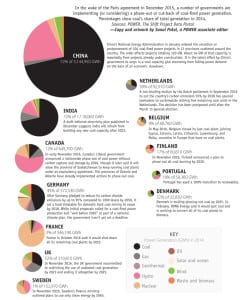The Netherlands to Quit Coal Power; UK and Canada Champion Global Transition Away from Coal
The Netherlands, a country that recently commissioned three state-of-the-art coal plants and has been reluctant to close them, on October 10 moved to phase out coal power by 2030. Meanwhile, the UK and Canada this week jointly urged other nations to drop coal from their power profiles.
The countries are part of a growing list that have vowed to phase-out or cut-back coal-fired power generation. [Related: The U.S.’s War on Coal Is Purported to Be Over—What About the Rest of the World?]

The Netherlands to Go Coal Free
As part of a coalition agreement reached on October 10, Prime Minister Mark Rutte’s center-right government promised to phase out coal generation in the nation by 2030. But the agreement also binds the government to set a carbon floor price to cut carbon emissions by 2030 as well as to back stricter measures that would enable the European Union (EU) to meet targets under a 1.5-degree-C global warming scenario.
Significantly, it imperils three 2015-commissioned coal-fired power plants, which have already been struggling economically. The plants’ owners, which include Engie, RWE, and Uniper, have separately noted that falling demand, low wholesale prices, and a surge of renewable energy capacity have rendered coal power unprofitable.
A report published by the Institute for Energy Economics and Financial Analysis (IEEFA) last year documented how the three utilities had logged impairments worth billions of euros on the new power plants, concluding that political and market trends would drive valuations even lower.
The Dutch government’s announcement on October 10 “highlights the risk of investing in either new or existing coal-fired power, and the lesson is clear: National coal phase-out plans such as this, combined with the rise of renewables and the impact on demand of improved efficiency, put old electricity-production models at risk,” IEEFA said in an update.
Coal plants in Europe are also burdened with meeting stricter new air pollution limits for large combustion plants, which will require utilities to invest in new technology to retrofit coal plants, limit operations to 1,500 hours a year, or shutter facilities by 2021, it noted.
“Utilities will do well now to consider carefully whether to upgrade older and more polluting coal power plants or focus instead on more forward-looking, high-return investments, such as in digitalization, customer services and renewables,” IEEFA recommended.
A Joint Calling
Following a meeting on October 11 between Canada’s Minister of Environment and Climate Change Catherine McKenna, and the UK’s Minister of State for Climate Change and Industry Claire Perry, the two countries said they would champion a global alliance on the transition from unabated coal-fired electricity at next month’s United Nations climate change meetings in Bonn, Germany.
“At COP23 in Bonn we openly invite others who share our ambition to join us,” the countries said. The ministers noted that the UK and Canada have separately made official plans to phase out coal power.
Canada in November 2016 announced regulations to phase out coal generation by 2030. Coal made up a paltry 7% of its total power capacity in 2014.
The UK, meanwhile, announced its plans in 2015 to restrict the use of the country’s coal plants by 2023 and close all facilities by 2025. On April 21 this year, the country marked its first 24-hour period without coal generation, after the only coal plant running went offline. The UK’s coal generation’s share has drastically fallen as more plants close or switch to burning wood pellets. In 2016, it fell to 9% compared to 23% in 2015.
—Sonal Patel is a POWER associate editor (@sonalcpatel, @POWERmagazine)